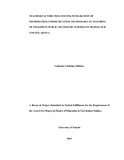| dc.description.abstract | The purpose of this study was to investigate teachers‟ factors influencing
integration of Information Communication Technology in teaching of English in
public secondary schools. The study sought to address the following objectives:
To examine the extent to which the teachers‟ demographics influenced integration
of ICT in teaching of English, to determine the extent to which the teachers‟
attitudes influenced integration of ICT, to establish the extent to which teacher
training influenced integration of ICT and to assess the extent to which the
teachers‟ lesson workload influenced integration of ICT in the teaching of English
in public secondary schools. The study adopted a descriptive survey design
making use of both quantitative and qualitative approaches. The target population
for this study was 3320 participants involving head teachers, teachers of English
and students. A sample size of 1660 participants comprising of 20 head teachers,
80 teachers of English and 1560 students was used for the study. The data for this
study was collected using two types of instruments, that is, questionnaires for the
teachers of English and students and interview schedules for head teachers. The
researcher used the test retest method to estimate the degree to which the same
results could be obtained within a repeated measure of the same concept.
Correlations of 0.76 for teachers of English and 0.72 for students were obtained.
Data analysis was performed using descriptive statistics such as frequencies and
percentages were used to analyze quantitative data. From the study it was
established teacher demographics (age, gender, academic qualifications and years
of experience) are not the only factors that determine the use of ICT. It was
further established that majority of the teachers of English,, head teachers and
even students all have a positive attitude towards the use of ICT. It was
established that majority of the teachers did not receive adequate training on ICT.
It was also established that many teachers had many lessons to teach in a week
thus had inadequate time to prepare for ICT related lessons. From the findings, it
was concluded that integration will only be successful if all teachers are taken
through ICT training as this will shape their attitudes, equip them with the
relevant skills and be able to plan properly for ICT related lessons. It was
recommended that the MOE should ensure that all secondary schools are provided
with ICT infrastructure of high quality. Teachers should be given basic ICT
training conducted through in service courses and seminars. In addition, teacher
with proficiency knowledge in computers should be employed to reduce lesson
workload. The study also recommended that further research be carried out in
other parts of the country as the study was limited to Mumias Sub County. | en_US |

